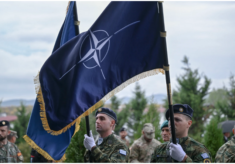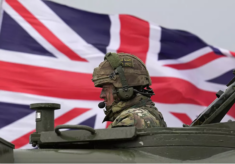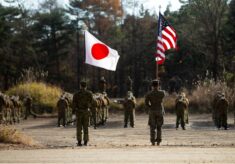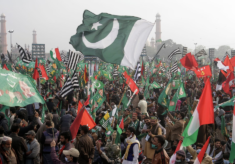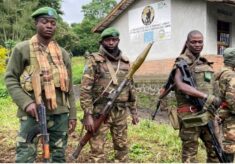For many, the late Trump decision to open the door to Turkish military in northern Syria by announcing the American troops’ withdrawal from Manbij was quite difficult to swallow. Not surprisingly, he did inform neither partners nor his own entourage, who had been opposing the move and apparently succeeded in partially reviewing it. However, Trump’s decision implied a clear-cut choice between Erdogan plans to organise a ‘safe zone’ in the area and consequently to have a greater saying in the future of Syria/ Middle East, and the Rojava Kurdish fighters who have been crucial allied in defeating ISIS. In so doing, he paradoxically accepted the idea that Kurdish allied are ‘terrorists’, as defined by Erdogan.
Identifying what terrorism is and who are terrorists has always been a problem even before the beginning of the Syrian/Middle East crises. Due to the lack of international consensus on a general definition of terrorism, regional and international protagonists targeted different armed groups and supported others in a complex divergent and convergent dynamics that actually prolonged the crisis feeding it.
Once the ISIS territorial terrorism has been dismantled, should we now consider the Rojava Kurds terrorists? Certainly not. They resemble more a national liberation movement than a terrorist group. Moreover, nowadays they seem to recognise that a large autonomy is the only achievable goal, as neither reunification with other Kurdish components nor independence are on the cards, due to inter-clanic fragmentation and international circumstances. Their chance for independence was missed almost century ago with the Treaty of Lausanne (1923).
Should we than dismiss Turkey security concerns? Certainly not. Leaving aside Erdogan’s neo-Ottoman ambitions, the border security argument should be taken seriously. Trans-border Kurdish connections can be traced back in the ’80, at the time when Ocalan organised PKK from Syria, where he lived for 20 years before being expelled by Hafez al-Assad under a Turkish threat of attack (1998). PKK is considered a terrorist movement by the entire Western community.
This is not to say that we should condone Ankara’s incursion in northern Syria – the third one after the 2016 e January 2019 offensives, both with US and Russia’s tacit agreement. This time, more than before, the scenario is producing, according to UN reports, a devastation of the territory, the exodus of hundreds of thousands civilians, including Christians, the execution of prisoners, brutal beatings, kidnappings, looting and the other horrors of war. Is this the ‘safe zone’ Erdogan had in mind? Non to mention the spreading of Takfirists once Kurdish detention camps have been left uncontrolled. Soft sanctions, as the ones announced (not implemented) by Trump, are certainly not stopping Erdogan.
NATO could have a crucial role there. Proving, among others, that it is neither ‘obsolete’ nor suffering ‘brain death’, according to recent unfortunate definitions. Of course, we would need to built consensus around the idea, and approve a UNSC resolution. Are the Europeans prepared to take such an initiative? To assume more responsibility and make a greater investment in the stabilisation of the region? To overcome their ‘strategic cacophony’ and act together pragmatically? Or are they waiting for a European Defence which will need a decade to take shape?
A NATO mission in Rojava would not be just a humanitarian emergency operation. It would respond: to the pervasive terrorist threat in the entire region; to the permanent instability extending to Iraq; to the heavy interference of regional States, including Iran; to the risk of new unrests (the so called Arab Springs 2.0) and additional chaos. As for Syria, it would give a crucial support to the works of the Constitutional Committee whose composition was finally decided in New York at the margins of the UN General Assembly in September. Turkey should be part of the mission, and in so doing it will be able to achieve more political influence at the negotiating table. Moreover a NATO presence would have the effect of reassuring Turkey vis-a-vis the Kurds and viceversa.
More important, Turkey would find a way to reconnect with the West, to rebuild the trust undermined by the perceived dismissal of Turkish interests in the Middle East, first of all due to the American alliance with Rojava Kurds. The Turkish claim on Rojava is among the causes leading Ankara to explore the Russian way and practice a ‘two ovens’ policy. But we should recognise that Turkey remains a crucial protagonist when speaking about security of the Middle East and, further on, the Mediterranean and Balkan areas. Europe’s interest is to re-establish working relations with Turkey, even if one does not like Erdogan’s semi-dictatorial regime.
The argument that a UNSC resolution would face obstacles in New York is not undermining the merit of pushing in this direction. It would be worth trying because Erdogan would be relieved, as he could claim that his military offensive resulted in convincing main partners to move; and the Russians, all in all, could find convenient to play the game, provided that one recognises their prominent and practically undisputable role in Syrian negotiations.
The challenge would rather be in Washington. Qualified sources maintain that, should Trump be re-elected in November 2020, a USA disengagement from NATO would prevail over other options. If it is so, a very short time is left for the Europeans to table a UNSC resolution in New York.
Laura Mirakian – Ambassador, Italian Ministry of Foreign Affairs, Rome

